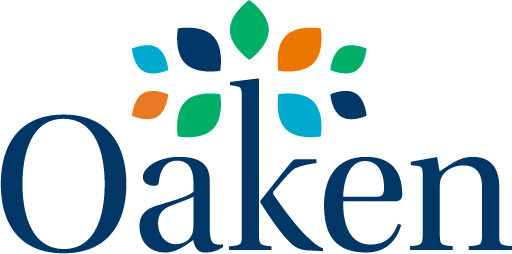At first glance, a Guaranteed Investment Certificate (GIC) may seem a very straightforward investment, but there’s actually a few things you need to consider before choosing a GIC. To help provide some insights into GICs, we’ve developed this list of the 10 most commonly asked questions. If you’re still unsure about anything here, we’d be happy to chat further. Just contact one of our Oaken team members at 1-855-625-3622 or email service@oaken.com.
1. What is a GIC?
When you invest in a GIC, you’re actually lending money to the financial institution that's providing the GIC. The financial institution will then use your money to provide loans and other services to their customers. In exchange for the use of your money, the financial institution returns your original investment, plus any outstanding interest due, when the GIC matures.
The following table lists some of the key GIC terms you’ll need to know when comparing GICs:
| Interest rate | This is the rate of return the GIC provides. While GICs typically pay a fixed rate, some GICs may offer a variable rate that fluctuates based on market conditions. |
| Term | The term is the length of time that the financial institution providing the GIC will hold your money. The most common terms range from 1 to 5 years, but you can also invest in shorter-term GICs that mature in as little as 30 days. |
| Maturity date | The maturity date defines when the GIC agreement ends, or matures. The full amount of the original investment will be returned, together with any remaining interest due at maturity. |
| Cashable / redeemable GIC | In addition to fixed-term GICs, you can also choose a cashable / redeemable GIC. This may be an option if you're unsure as to when you may need to access your funds, and don’t wish to be locked into a specific term. However. one downside to consider is that in exchange for this additional flexibility, expect a slightly lower rate of return than for a fixed-term GIC. |
2. Why invest in GICs?
Naturally, the investment choices you make will be determined by your own unique requirements and savings goals. If one of your primary considerations is to prioritize the safety of your funds while earning a predictable and stable rate of return, GICs might be a good fit. But you do need to be aware that in return for the high degree of safety provided by GICs, returns may be lower than what you could potentially earn with other investments.
3. When will I receive my money?
As noted earlier, a fixed-term GIC returns your initial investment, together with the interest you’ve earned, at the maturity date. Most term lengths range from 1 to 5 years, but if you opt for a cashable GIC you may be able to withdraw your funds after just 30 or 90 days without penalty.
4. What do I do when my GIC matures?
When you invest in a GIC, you can provide instructions on what you want to do with your investment at maturity. This can include redeeming the GIC and depositing the funds into the account of your choice, or automatically renewing the GIC for the same term and at the current interest rate.
5. Are GICs eligible for CDIC coverage?
The Canadian Deposit Insurance Corporation (CDIC) is a federal Crown corporation created specifically to protect your savings should the financial institution cease operations. GICs and other deposits held by CDIC member institutions, including banks, trust companies and other regulated financial institutions, are eligible for CDIC coverage.
CDIC currently provides up to $100,000 in coverage for each eligible account type held by a CDIC member institution. Oaken offers deposits through two issuers – Home Bank and Home Trust Company –both of which are separate CDIC member institutions. You can read more about CDIC coverage eligibility on the CDIC website.
6. How are GICs different from bonds?
Like a GIC, a bond is a type of loan made to a government or corporation. As the holder of the bond, you’ll receive a coupon payment (i.e. interest payment) when the bond matures.
Unlike a GIC, however, the face value of a bond can fluctuate in response to changing market conditions. For this reason, a specialized market exists where bonds are traded and buyers and sellers attempt to profit on these fluctuations. Another important distinction is that bonds issued by private companies are not eligible for CDIC insurance.
7. What GIC term length should I choose?
There a couple of things to consider when deciding on the term for a GIC. Because your funds will be locked-in until the GIC matures, make sure you will not need your money before the maturity date. If necessary, you can choose either a GIC with a shorter term, or a cashable GIC that allows you to access your money in as little as 30 days. You can see Oaken’s current rates for each term on our GIC rates page.
8. Will I be taxed on my GIC?
The interest you earn is considered part of your income. This means you will be taxed at your marginal tax rate, with taxes payable to both provincial and federal governments.
However, because GICs may be held in a registered plan, such as a Registered Savings Plan (RSP) or Tax-Free Savings Account (TFSA), it's possible to defer or completely eliminate taxes on the interest you earn. Be sure to speak with a tax specialist if you have questions.
9. Can I hold GICs in a registered plan?
As noted above, GICs are eligible for inclusion in registered plans, including RSPs, TFSAs and RIFs. Contribution limits and other eligibility requirements still apply, so be sure you have sufficient room in the registered plan to avoid penalties for exceeding your contributions limit.
10. What if I need my money before my GIC matures?
Because GICs are a fixed-term investment, generally speaking, it is not possible to redeem a GIC prior to maturity. Financial institutions may, at their discretion, allow early redemptions, but this would only be under very exceptional circumstances, and you may be subject to a financial penalty.
If you’re concerned that you will need the money before the maturity date, you should consider a shorter-term GIC, or even a cashable / redeemable GIC.





 GIC
GIC
